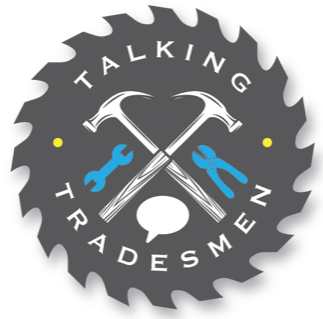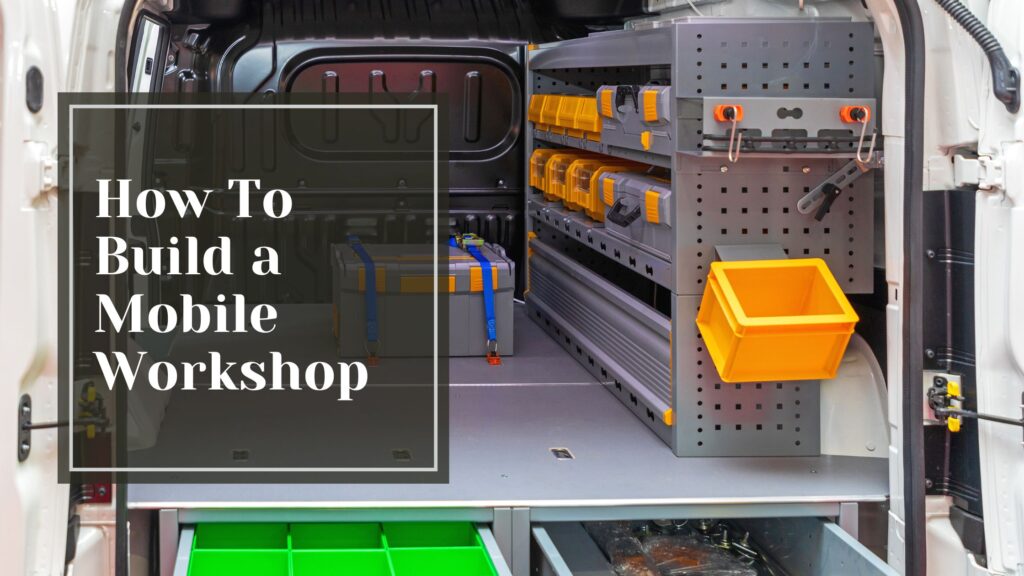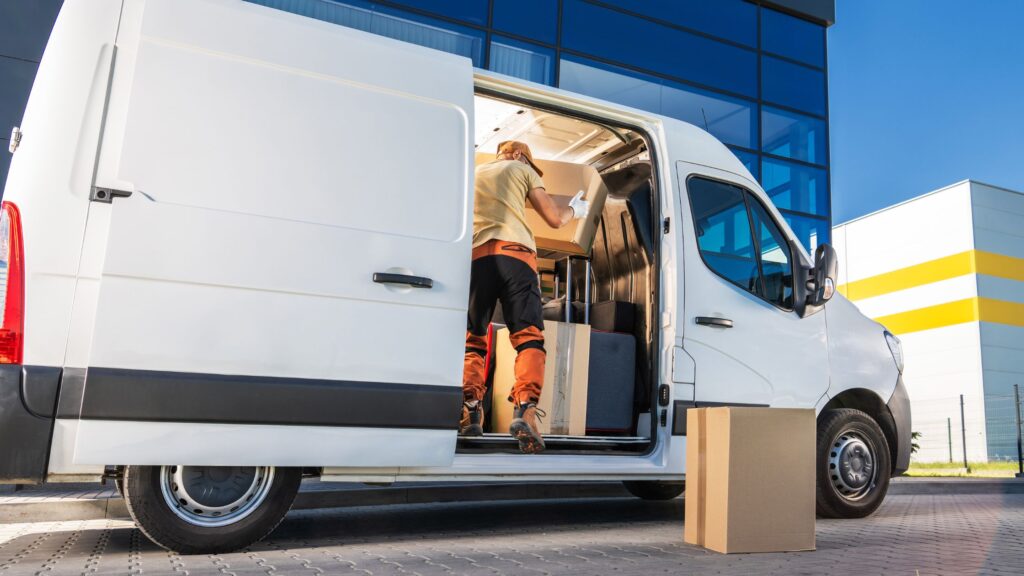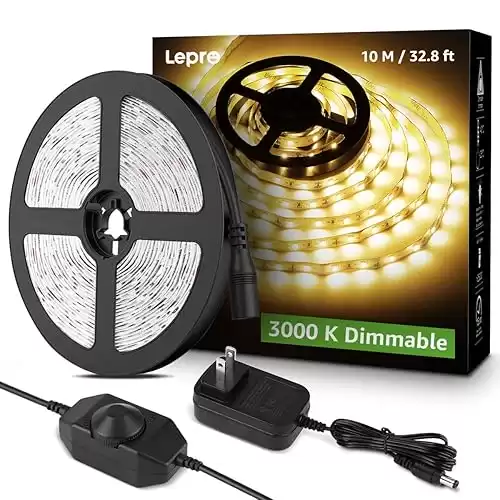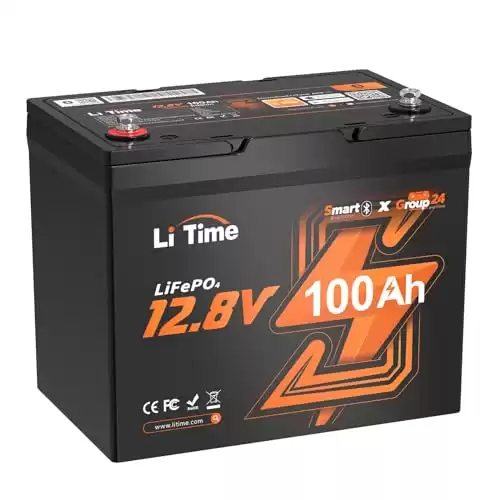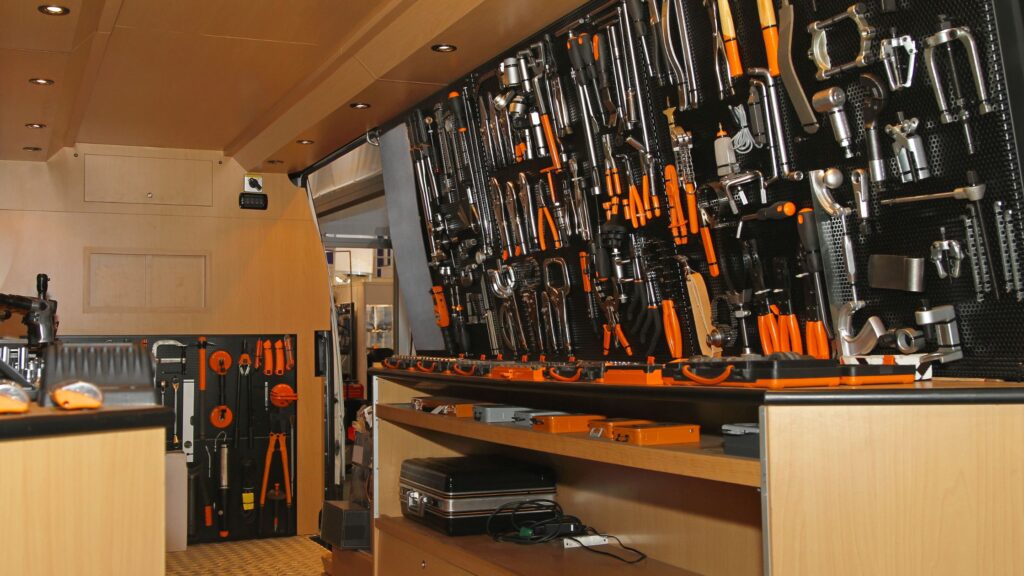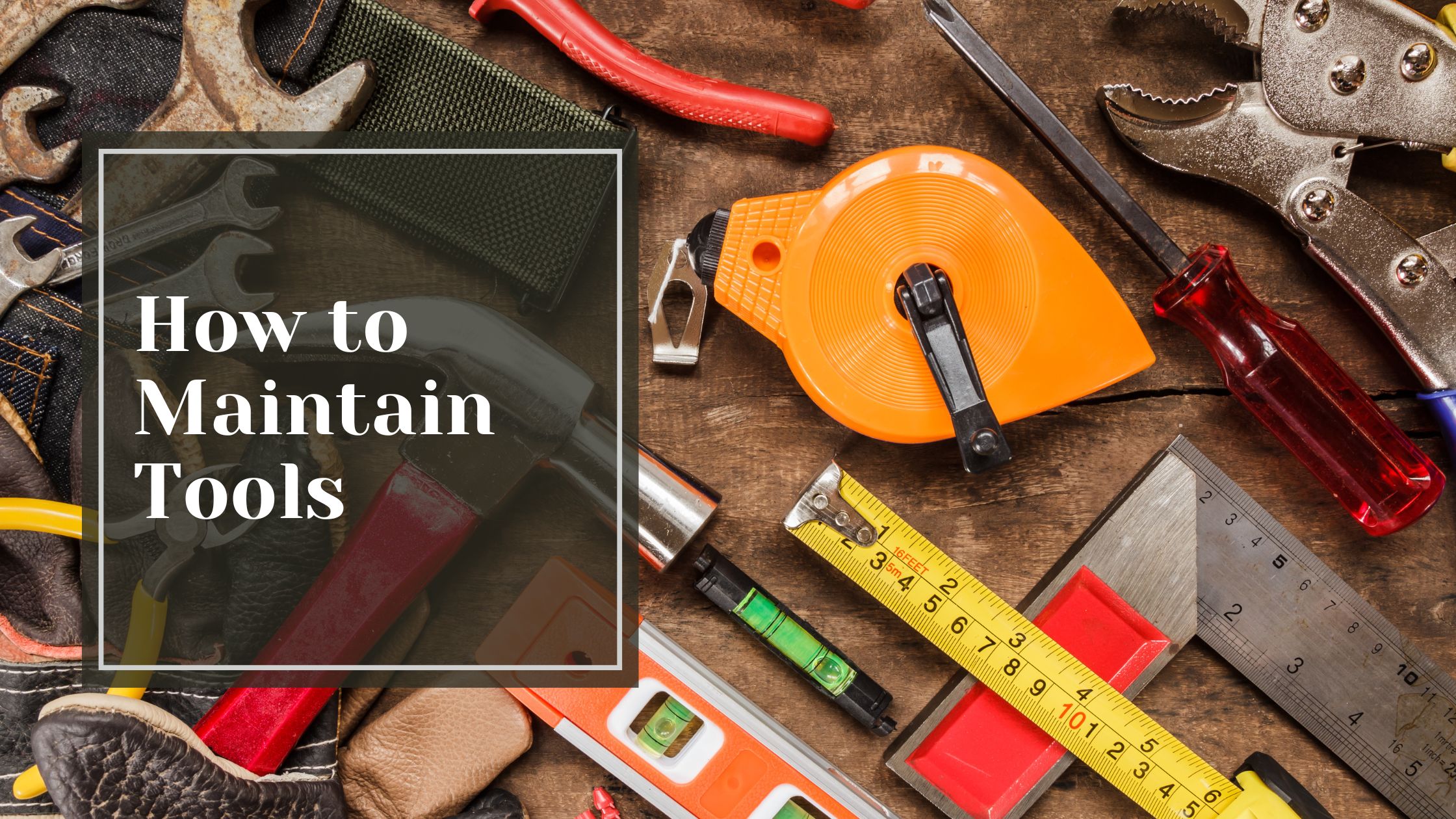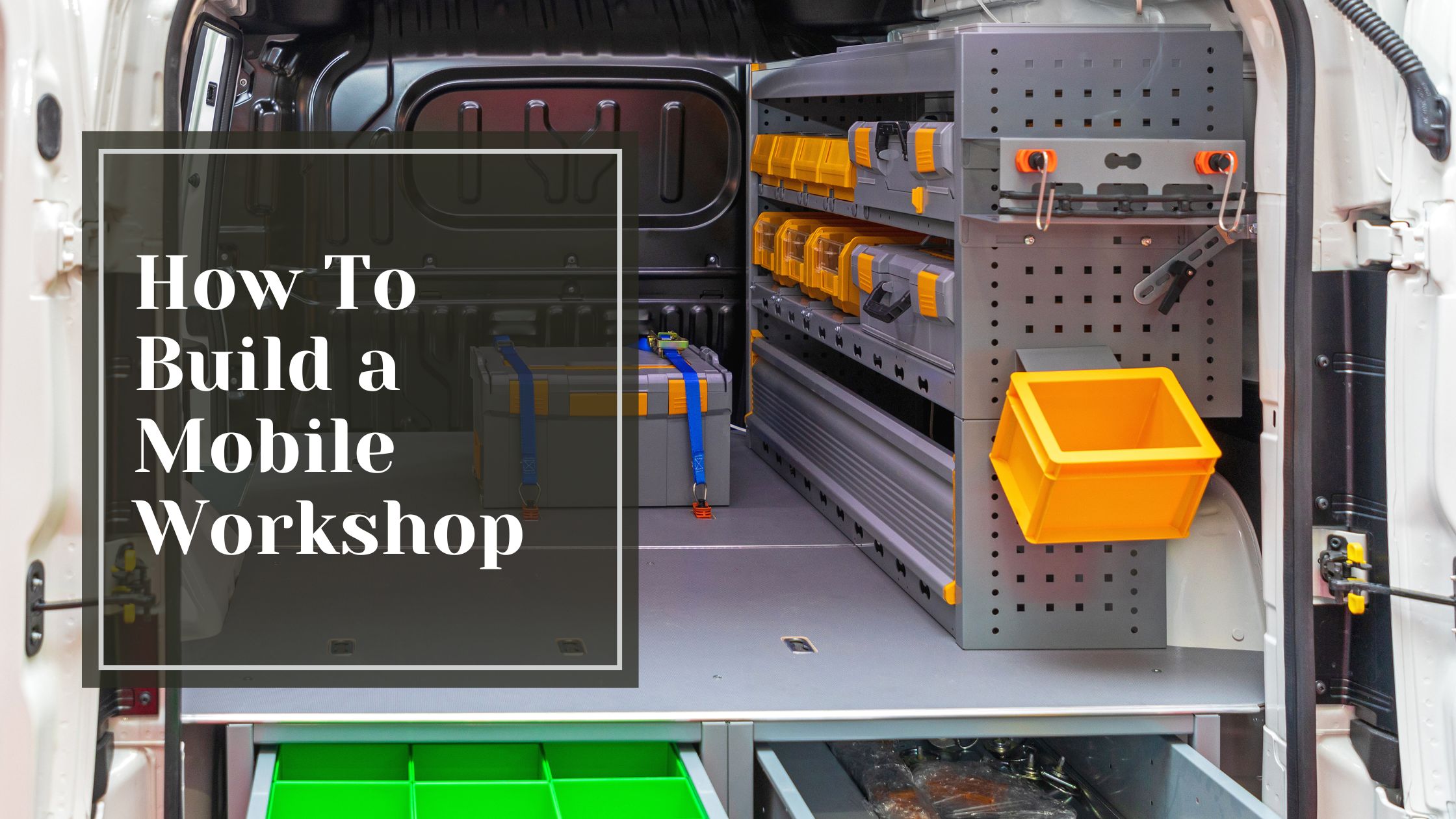Do you sometimes wish that you could also have a mobile workshop? What if I told you that you drove up to a worksite and all your tools were neatly arranged and at the ready? There will be no more hauling heavy toolboxes or searching for that one important piece of equipment that you may have left behind. Well, get ready to turn that dream into reality! In this guide, we are going to explain how you can build your mobile workshop step by step from the very beginning. Whether you are an amateur using a wrench over the weekends or an expert at employing a wrench, you will understand how to convert a simple van or a trailer into mobile work equipment on wheels. Ready to move your projects (and yourself) into a whole, new sphere of productivity? Let us get on with the business of building!
Table of Contents
Toggle
Planning Your Mobile Workshop Build
Undertaking the construction of your mobile workshop, it is important to define first all the plans and what it intends to achieve. This is a complete project that requires a proper project explanation. Especially since this project is aimed at creating a movable workspace, correct planning will prevent configuration schematical errors.
Assess Your Needs
First, you will have to write down the tools and apparatus you will need in the mobile workshop. Relate the kind of tasks that are to be done and the workload that will go with each job. The one that should not be missed is the aim of storage where every other material and supplies that may be needed will be kept. This will assist in making chip to the excess size of the vehicle or trailer that you will be comfortable working from.
Choose Your Base
Choosing the appropriate vehicle or trailer is vital. The available options include the cargo vans and box trucks, as well as the enclosed trailer. With every method of transport comes advantages and disadvantages related to flexibility, capacity, and expense. Think about the fuel economy of such vehicles, whether they are easy to park, and if the driver has to have a special license to operate them.
Design Your Layout
Map out the physical dimensions of the workshop in conformity with the requirements of ergonomics and productivity. Make provisions for lighting, windows and doors, and electricity. Consider the use of foldable workbenches or retractable tool cabinets to serve this purpose efficiently. fire and first aid carries should also be on the designing table.
Designing and Laying Out Your Mobile Workshop
In our planning world, it has always been said that planning is of absolute importance. Wherever you plan to cluster these things, it will be equally important to provide free movement – a workflow. Ok, now here are some intelligent approaches that will help you design your mobile workshop as productively as possible.
Optimize for Workflow
Consider how you usually operate in your workspace and arrange your working place in that manner. Plan separate work areas for cutting, assembly, finishing, and other functions. This way, you will be able to progress easily from the next step to another without the need to keep on manipulating your workspace.
Don’t Forget Power and Lighting
Realistic electrical service and adequate lighting are most often unnoticed but mainly pivotal in any process. Put in place an ordered electrical wiring system capable of sustaining several operating tools at once. As for the lighting, pick up the bright, flexible LED lights that will evenly distribute illumination in the working area. It is worth noting that good sight is not only a matter of ease, it is a critical issue.
Building the Frame and Structure
The frame plus structure is what you may consider the heart of your project on how to make the portable workbench. In this section, we have to be very specific about how to get this important stage done.
Choosing the Right Materials
Let’s begin with the material: it has to be strong enough to cope with the harshness that is presented by the transportation. Aluminum is very popular owing to its lightweight and non-corrosive features to rust. On the other hand, if you don’t want to spend money, treated wood is an option. However, the objective is to build a firm structure that can hold the tools that you have safe.
Designing for Functionality
Now, put on your thinking cap and sketch out your design. Consider how you’ll use the space and what tools you’ll need to access frequently. Pro tip: incorporate adjustable shelving and modular storage solutions to maximize flexibility. Don’t forget to factor in weight distribution – you don’t want your mobile workshop tipping over at the first sharp turn!
Assembly Time
Time to roll up your sleeves and get building! Begin with the base frame, ensuring it’s level and square. As you construct the walls and roof, double-check measurements frequently. Remember, precision at this stage will save you headaches down the road. And don’t skimp on reinforcement – your mobile workshop needs to handle bumps and vibrations like a champ.
The Lepro LED Strip Light offers 16.4 feet of bright, flexible illumination, perfect for enhancing visibility in any workspace. With 3000K warm white lighting and a dimmable feature, it allows for customizable brightness. The strong adhesive backing makes installation easy, making it ideal for mobile workshops, kitchens, and more.
Adding Power, Lighting, and Utilities
Let’s shed some light on your mobile workshop’s power needs! A well-lit, fully-powered workspace is crucial for getting things done on the go.
Powering Up Your Workshop
First things first, you’ll need a reliable power source. Consider installing a deep-cycle battery or two, depending on your power requirements. These bad boys are designed to provide steady power over long periods, perfect for your mobile setup. Don’t forget to add an inverter to convert that DC power to AC for your tools.
Let There Be Light
Good lighting is non-negotiable in a workshop. LED strip lights are a game-changer – they’re energy-efficient, bright, and easy to install. Mount them under cabinets or along the ceiling for overall illumination. For task lighting, add some adjustable LED work lights. They’ll help you focus on the details without straining your eyes.
Water and Climate Control
Don’t forget about creature comforts! A small sink with a water tank can be a lifesaver for cleaning up or washing your hands. And for those sweltering summer days or chilly winter nights, consider a compact heating and cooling system. It’ll make your mobile workshop a comfortable place to work year-round.
This 12V deep-cycle battery features Bluetooth connectivity for easy monitoring and low-temperature protection, ensuring reliable power for your mobile workshop even in harsh conditions. Its compact design and long-lasting performance make it ideal for powering tools and equipment on the go.
Outfitting Your Mobile Workshop Interior
Maximize Space with Smart Storage Solutions
When it comes to setting up your mobile workshop, every inch counts. Start by installing modular shelving units along the walls. These adjustable systems allow you to customize storage for your specific tools and equipment. Don’t forget to use vertical space – add pegboards or magnetic strips to keep frequently used items within easy reach.
Create a Functional Workbench
The heart of any workshop is a sturdy workbench. For a mobile setup, consider a fold-down design that can be tucked away when not in use. Look for options with built-in storage drawers to maximize efficiency. Pro tip: Add a non-slip surface to keep your projects steady on the road.
Lighting and Power
Good lighting is crucial in a mobile workshop. Install bright LED strips under cabinets and a powerful overhead light. Don’t skimp on power outlets – add several strategically placed around your workspace. For ultimate flexibility, include a portable power station for those off-grid projects.
Safety First
Remember, your mobile workshop is always on the move. Secure all tools and equipment with bungee cords, straps, or custom-fit foam inserts. Install a fire extinguisher and first aid kit in easily accessible locations. Lastly, ensure proper ventilation with roof vents or windows to manage fumes and dust.
How To Build a Mobile Workshop
So there you have it – your roadmap to creating an awesome mobile workshop from the ground up. With some careful planning, elbow grease, and a dash of creativity, you’ll soon be cruising around in your very own DIY paradise on wheels. Remember, the beauty of a custom build is making it uniquely yours. So don’t be afraid to experiment and add those personal touches that’ll make your mobile workshop truly one-of-a-kind. Now get out there and start bringing your vision to life! Who knows, you might even inspire others to join the mobile maker movement. Happy building, and enjoy your new workshop on the go!
Frequently Asked Questions
How To Build A Mobile Workshop From Scratch?
To build a mobile workshop from scratch, start by selecting a suitable vehicle like a van or trailer, plan the layout, and ensure you have proper storage solutions, lighting, and power systems. Focus on organizing tools efficiently to maximize productivity on the go.
What Are The Best Tools For A Mobile Workshop?
The best tools for a mobile workshop include portable power tools, adjustable shelving, foldable workbenches, and LED lighting. These tools ensure that you have a compact yet efficient setup that can handle a variety of tasks wherever you go.
Can I Build A Mobile Workshop On A Budget?
Yes, you can build a mobile workshop on a budget by using cost-effective materials like treated wood for framing and opting for a used van or trailer. Focus on essentials like basic storage, power supply, and compact, affordable tools.
How Do I Power My Mobile Workshop?
To power your mobile workshop, consider using a deep-cycle battery with an inverter to convert DC to AC power for your tools. You can also add solar panels or a small generator for off-grid power needs, ensuring reliable energy wherever you go.
Why Is Lighting Important In A Mobile Workshop?
Lighting is crucial in a mobile workshop as it ensures that you can work safely and efficiently, even in low-light conditions. LED strip lights are ideal because they are bright, energy-efficient, and easy to install, providing even illumination throughout your workspace.
